What’s the Difference Between an Israeli and a Palestinian?
Last Updated on April 7, 2020 by Adam Watts
It seems Israel and Palestine are once again busy trading rockets and getting people killed on both sides like a playground fight that got way out of hand. In the latest conflict, the death toll stands (as of writing) at 3 Israelis and 86 Palestinians which, to me, suggests that if you are going to have a religious war, it’s best to put more resources into high-end weaponry and missile defence systems and less into prayer and knock-off rockets fallen off the back of a lorry.
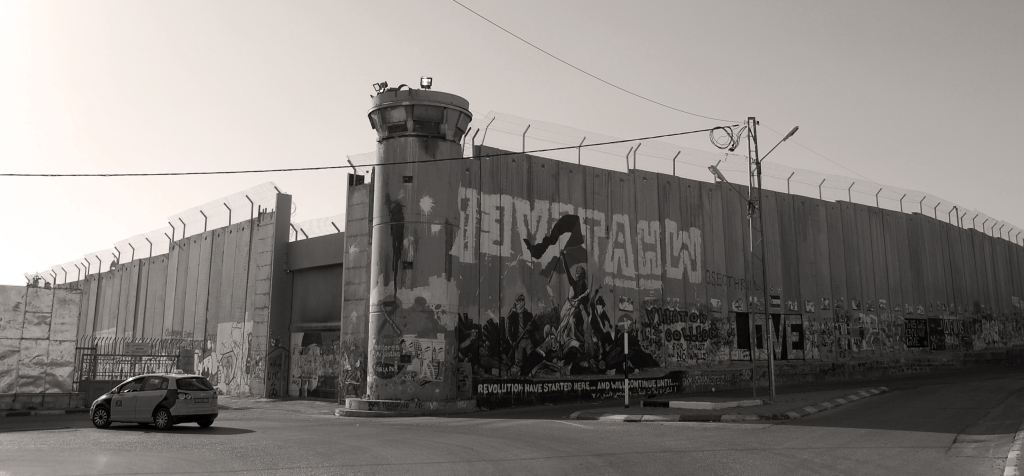
Now, before I continue, I should say that I’m probably going to offend people writing this. I’m sorry. I’ll do my best to offend both sides equally but if you want to launch a fatwa against me anyway, go ahead. My real name is Mr D. Cameron and I live at the tenth house on Downing Street in London, England. You’re welcome for tea and biscuits any time.
I’ve never been to Gaza so I’m not sure what, if any, differences there are, but I did visit the West Bank/Palestine with my American friend. I suppose, now that I think about it, the biggest difference at the moment is that the West Bank isn’t having the ever-loving almighty bejesus bombed out of it.
In the West Bank we spent three nights with an American activist in Bethlehem and we did a day trip to Hebron, supposedly the town where you can see clearest the tension between the two states – all right, smart arse, Gaza City probably holds that title at the moment; although, in counter-smart-arsery, that’s not in the West Bank, so neeeeerrrr.
Our guide, a local resident wanting to share his story, led us down what the locals call “Apartheid Street” in Hebron and we passed through a military checkpoint. After looking at my passport, the hot military chick waved me through without a second glance at my backpack. Having a British passport is one of the best things about being born on this humble little island. But little did she know I actually had a variety of new gadgets fresh out of Q’s warehouse piled into that backpack.
We followed the path, then when the path disappeared we climbed over a few mounds of rubble, shuffled through some overgrown bushes, and up a ladder – dodging a few tree branches on the way up – and onto the roof of his house.
“If they see you, they might shoot you,” our guide said to us. It was simultaneously the most terrifying and cool thing anyone has ever said to me. I laughed, but I was silenced when I saw the Israeli soldier patrol along the walkway about twenty feet away. My British passport was good but it couldn’t stop bullets.
We were in one of the West Bank’s notorious “settlements”, which are areas where Israeli civilians have moved into Palestinian territory under the protection of Israeli soldiers.
“Look,” our host said, pointing to the bottom of the water tank on the roof. “Bullet holes. They shoot this tank so we do not have water. Never have water. We get a new tank, they shoot that too.”
Around the house itself, in the garden was a series of suspect-looking plastic bottles. Urine, we were told. “They throw them from their houses up there.” He pointed.
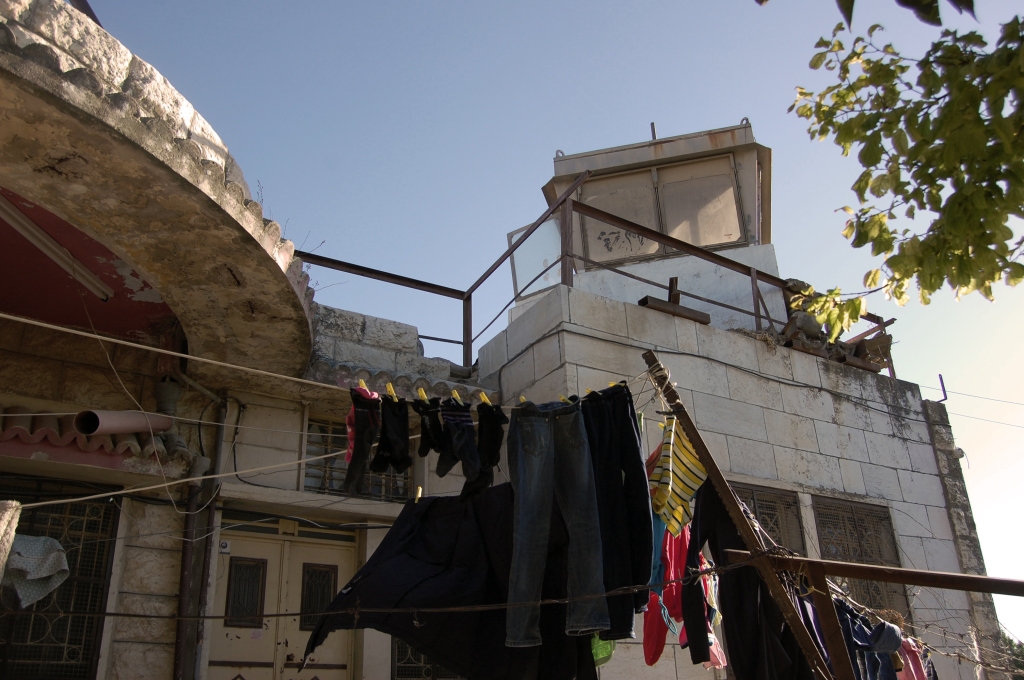
Inside the house great chunks of the walls were scorched. “Flamethrowers,” our guide said casually, like it was no bigger a deal than having a double glazing salesmen come round. “They come when we are not here.”
There were spaces were windows used to be, but were now sealed and chained. Some windows were outright smashed. Everything was so filthy even Kim and Aggie would’ve called it quits. I couldn’t help but notice the Fairy Liquid by the sink; their attempts at normality were as absurd as they were stoic, like grabbing an umbrella at the first sign of volcanic eruption.
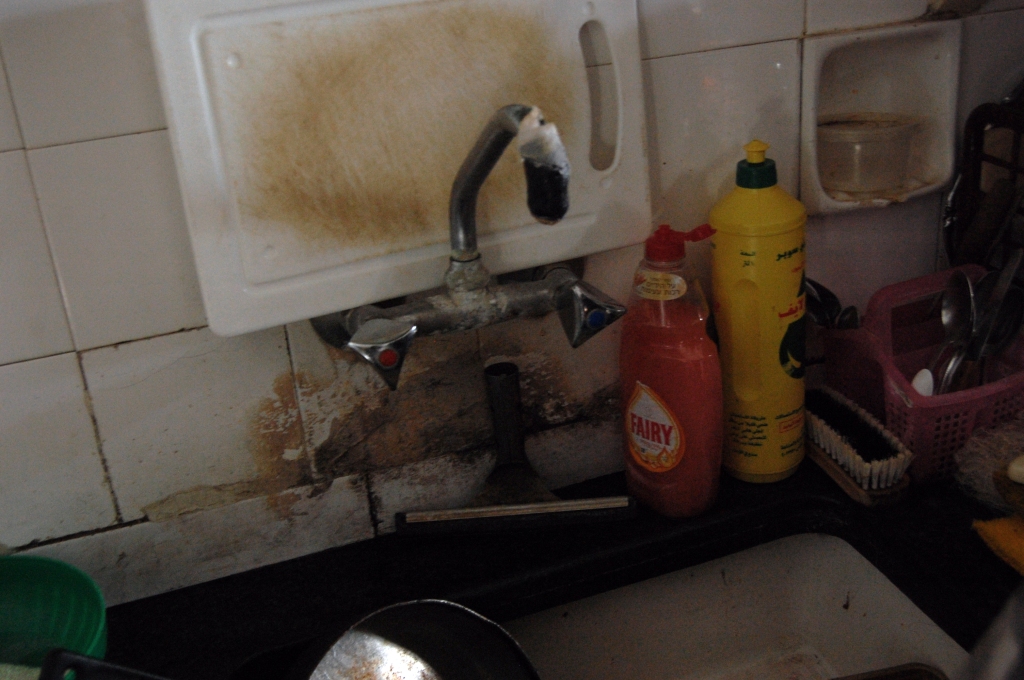
We passed two young boys in the house. “It is difficult. We cannot let them go anywhere. My uncle had his grand-daughter kidnapped. And the wire and glass on the ground – it is not fun for them.” Is that understatement of the year all wrapped up?
After the tour we sat down in the living room. I’m not sure if they were way ahead of their time or behind it, but the focus point of the room was a computer. It was an ancient thing, running Windows 98 at best, but on it we watched two videos. Videos made by an amateur film company and a grainy news report respectively, both designed to highlight the plight of Palestinians living here.
“Do you see a solution to the current situation?” My American friend asked.
“It’s complicated,” was the reply.
A few days later I was back in Jerusalem, staying with a guy who served for three years in the Israeli Defence Force (IDF) and was involved in the Gaza War, a three-week armed conflict in the winter of 2008-2009 in the Gaza Strip. On the first night he took us to a gay party under the walls of the Old City, where I had a strange encounter with an Israeli goat herder. The next night he cooked for us, taking extreme care to keep everything kosher, and we talked politics and religion until the early hours.
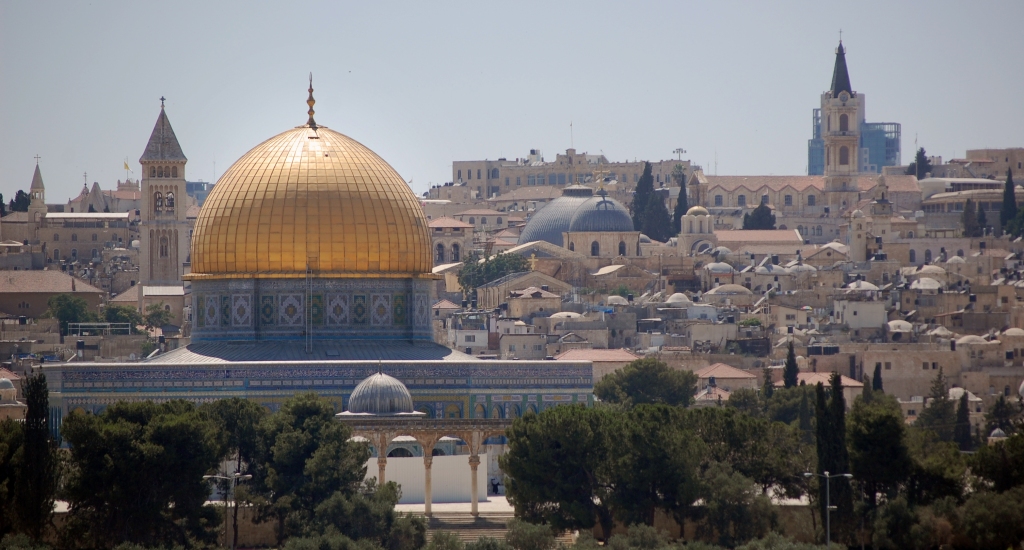
“If they want to keep attacking us, we’ll keep killing them. We don’t want to kill them. We want to live in security, to have jobs, to have homes, to be happy. But if we don’t feel safe, we’ll shoot them. We all join the military, we all serve, we all know what war is like, but we’ll die for this country. These are our homes.
“I don’t know what’s beyond the wall, I don’t know what Ramallah and those places are like. I don’t want to know. They can stay there and they can come to Jerusalem because most of them probably want the same things we do. But if they use bombs we will shoot them. We can’t live in fear. No one should be expected to live in fear.”
While you were reading that, six more pinpoint airstrikes on military targets ripped through Gaza City and a few dozen more wayward rockets were fired towards Tel Aviv.
“What do you think will happen?” Asked my American friend. “Will Israelis and Palestinians ever live in peace?”
“Well, I think it will get worse before it gets better,” he said, presciently. “But it’s complicated.”
Fast forward six months and I’m sat at home watching Israel and Gaza rack up kill counts faster than the latest Call of Duty game. I can’t help but think of the people I met in Israel and Palestine. I think of them and I know they’re afraid of the air raid sirens and the hum of the drones, but they’ve come to accept that they’re a part of life as they go about buying their Fairy Liquid and preparing their kosher meals, going to their jobs and maintaining their homes. They, and I, know that because of religious scripture and political manoeuvring and the massive stockpiles of weapons that are lying around, any peace treaty that gets made will only be a temporary solution.
Teacher will call everyone back in after lunch, there’ll be a few classes about ethics and why bullying is bad, homework will be set, but by tomorrow everyone will be back out on the playground with yesterday’s lessons already forgotten.

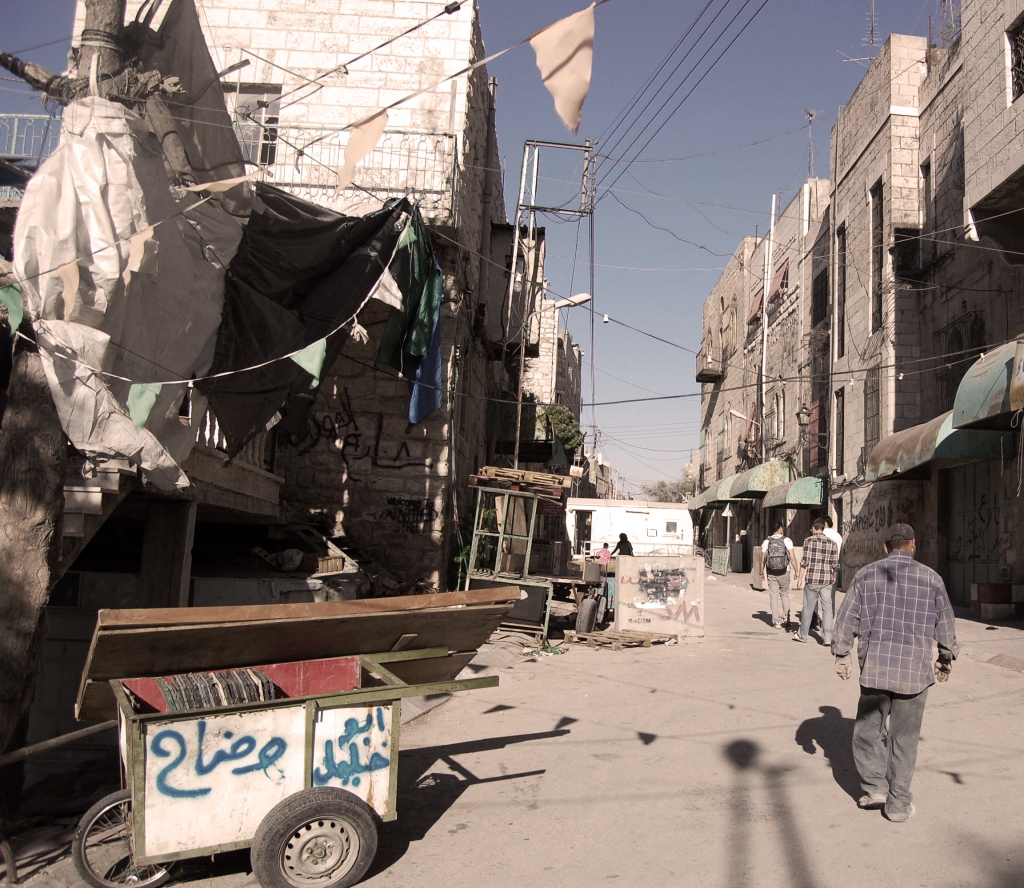
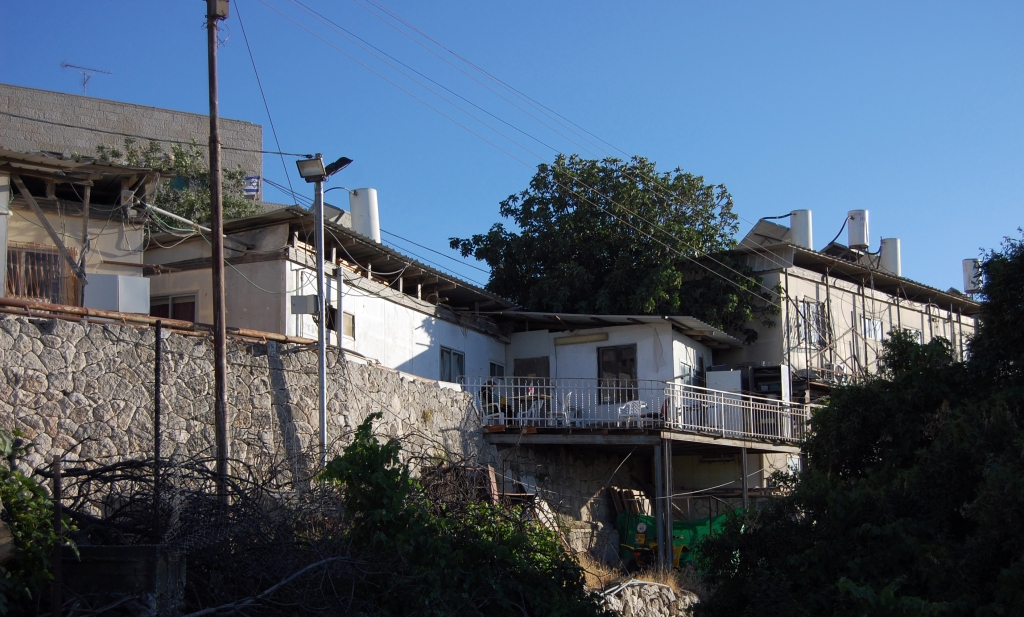






Thanks for sharing your trip details to Israel & Palestine. I’m from Egypt and i was brought up in Kuwait where most of my class mates were Palestinians. i can not say i have a lot of feelings for them cause they blame us Egyptians on the loss of their lands. They think it is Egypt’s duty to get this land back to them????
Israelis are not angles either.
i loved the comment mentioned by both,the former israeli soldier and the palestinian guide, in your story “its complicated”. indeed it is!
The problem is not religious At All. I’m a muslim with a good understanding of the values of my religion. Islam does not preach killing of Jews, well islam doesn’t but some muslims do. BIG difference.
in fact islam doesn’t preach any type of killing except for defence, but some muslims do not look at this way.
anyway, its complicated….
I visited Palestine in the summer and stopped just outside Hebron. Hebron is the most distressing of situations. I came back thinking that there was no hope.
What is happening in Gaza is horrific and can not be justified by any means. Thank you for highlighting the story as you have such a big following..I am trying to get there, writing what I saw and experienced.
http://shakingtheshadowsfromtheolivetrees.wordpress.com/
http://kokojaeger.wordpress.com/2012/11/16/here-we-go/
Written by my friend who has been living in Tel Aviv.
I was able to visit Ramallah when I went to Israel, and like you had, I got an interesting take on both sides of the story. My host in Ramallah was a Swiss guy who worked with the Red Cross in Palestine, and due to things he experienced decided to work with a non-profit there after. He told us the whole Israel/Palestine colflict from the Palestinian point of view (which I’d never heard before). But what was most interesting to me, was that all of my young Israeli hosts were very much like the one you talked to. They just want the Palestinians to be able to live their lives, and they want to live their Israeli ones. But if they’re attacked, they’re going to fight back.
What’s sad is that by the time they grow up and are able to take the leadership positions, I think they don’t hold these views anymore (on both sides of the wall) as they now have too much baggage to feel they can move past it to peace.
just a quick comment based on the fact that i’m Egyptian. so i’m a citizen of the middle east and i would like to share with you a thought. To the majority of people in the middle east, regardless of their religion, we look at it from a different perspective. the perspective simply is, this land belongs to the Palestinians. The state of Israel was declared in 1948, so what was there in this land before 1948??? Its too late to get into discussions of where should the state of israel go cause it is a fact of life that all people have to deal with. But young and old palestinians look at it this way. one of my school friends is from Gaza. he is now a physician in Dubai having a great life. in a discussion few months ago he said Dubai is temporarily i will go back to Gaza. i was surprised, Why would you do that? his answer was clear and blunt, he said “its my country, its where i belong with my kids and family”. Just a thought.
Reblogged this on Walk on the Ocean.
It seems like the phrase “It’s complicated” could be the first step in uniting the Israelis and Palestinians. Their shared distaste for in-depth discussions on problems and solutions is the base on which, Inshallah, a two state Israel/Palestine can be formed… Also, Adam, I just found this bitchin’ Palestinian restaurant with the best hummus I’ve found since we left Jerusalem all those months ago…
A Palestinian restaurant in Charlotte? Sweet! Start spreading the word. I haven’t had hummus once since we got back, haha!
As a former military officer in the Philippine Army, I can see some similarities here with the Moslem situation in our southern frontier. It, too, is complicated. There is that vicious cycle of violence that makes finger-pointing so easy. However, we continue to be hopeful here that a peace agreement will soon pave the way to silencing the guns finally. We cannot afford to be cynical now. We have to take whatever small victories there are for our quest for peace.
I did some write-ups on the ongoing peace talks in our southern border. I hope that we can all help push all the peace initiatives around the world.
“I Dream of Peace”: http://cbholganzablog.wordpress.com/2012/12/12/i-dream-of-peace-2/
“Volunteering for Peace in Mindanao”: http://cbholganzablog.wordpress.com/2012/11/30/volunteering-for-peace-in-mindanao/